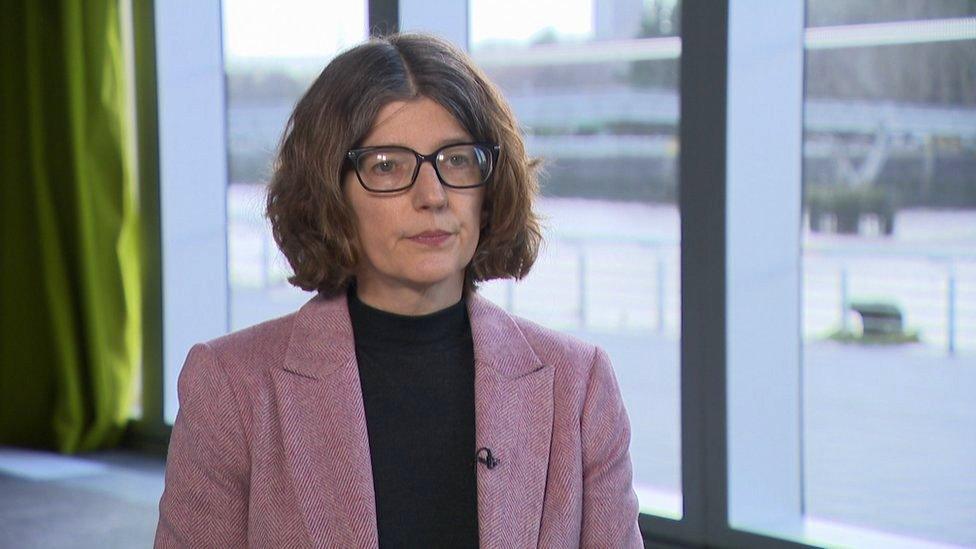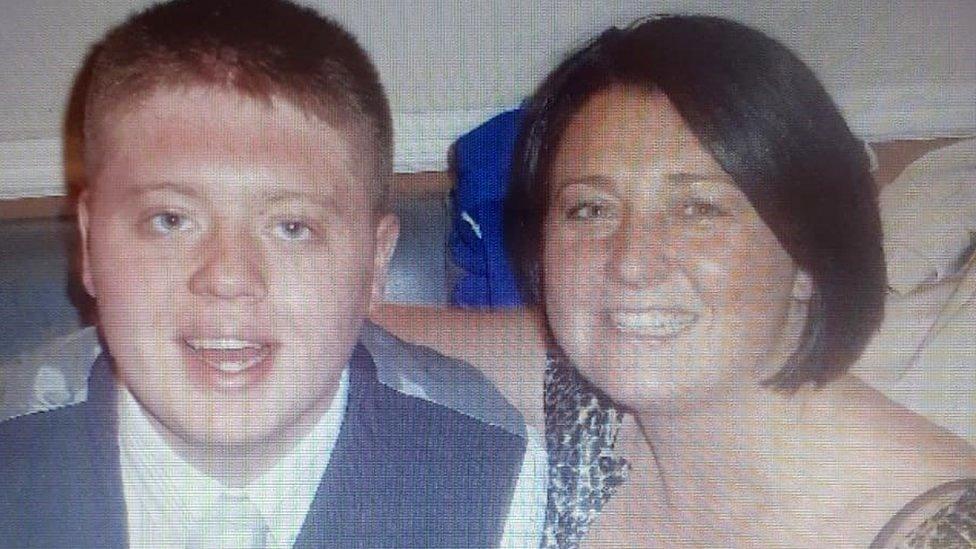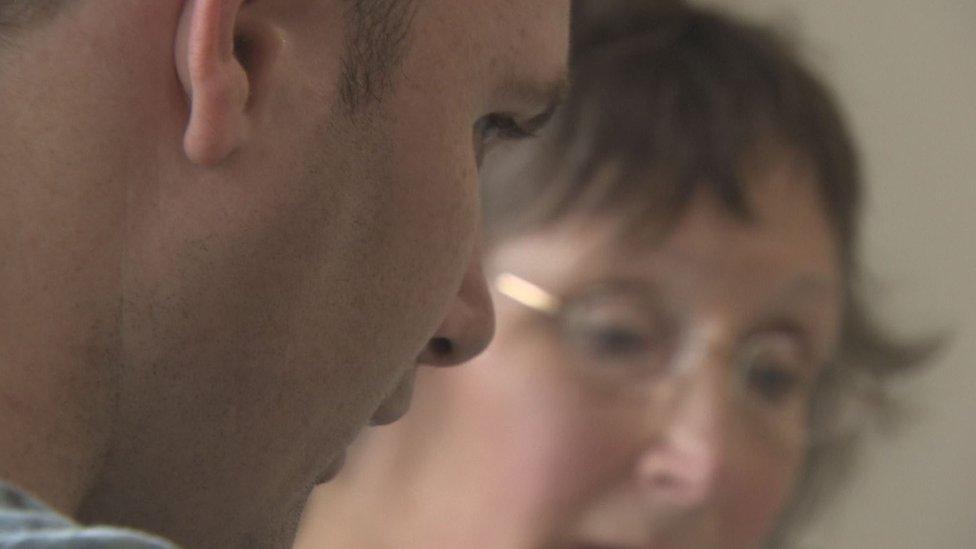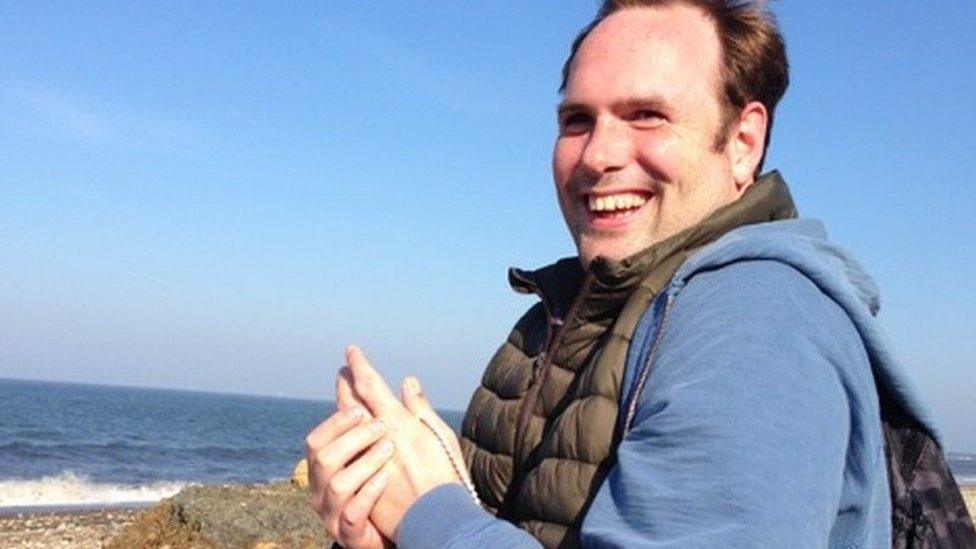Pledge to move learning disabilities care nearer home
- Published
Louis Sainsbury has been stuck in institutional units for years
Significantly fewer people with learning disabilities will be stuck far from home or in hospitals by March 2024, Scottish ministers have pledged.
It follows a report , externallooking at why people with complex needs were in out-of-area placements and had inappropriate long stays in hospital.
It recommended a new national register of those with learning disabilities stuck in hospitals.
And a national oversight panel to hold local authorities to account.
Mental Wellbeing Minister Kevin Stewart said it was "completely unacceptable" that people were spending time in hospitals or other care settings when they were medically fit for discharge.
"This is not going to be an easy task but we have a collective responsibility to take action," he said.
Dozens of people with learning disabilities and complex needs are recorded as delayed discharges from hospital in Scotland.
They can often be stuck for many years in a hospital or care institution when they ought to be discharged to live in the community.
The numbers for those with autism or learning disabilities who are held out of their local area are not routinely recorded.
The Scottish government's own adviser told the BBC many of them had been "forgotten" or "lost" in the system.
One example highlighted in the working group report was Louis Sainsbury.

Louis and Kate Sainsbury are trying to move to a new arrangement in Perthshire
Louis developed meningitis when he was four days old. As a result his speech is impaired and he has learning disabilities.
His mother Kate Sainsbury said he had been stuck in an institutional unit for years. At one point he was hundreds of miles from home in Hartlepool.
"I don't want to dwell on the bad times but some of those bad times were horrible," she said.
"It has been a four-year nightmare trying to get my son quality care in his own home. And we are not at the end of the road. This is just the beginning."
'Transition is crucial'
Louis is now in the process of getting out of the locked hospital unit where he's been for more than three years - spending half his week in Perthshire, getting used to his new house and new care team.
"Transition is really crucial," Kate told the BBC.
"You have got to be able to build relationships with the people who are going to go forward in looking after somebody who is currently in hospital and you have got to fund that so there has got to be funding for the hospital placement and the care team."
She said collaboration was crucial too and where there was a parent involved their expertise had to be recognised.
Louis' story is highlighted in the report, which recommends a national register for people with learning disabilities stuck behind locked doors and a national panel to monitor their release.
Earlier this month, BBC Scotland highlighted the plight of three mothers whose sons have been stuck in hospital units for years.
Kate Sainsbury said that what they had created in Perthshire for Louis was one example of how things could be done differently, but it needed committed staff and resources to succeed.
Louis' new home was part-funded through a medical negligence award. His care is funded by the local authority and his disability allowance.

Dr Anne Macdonald said people had been "lost" in the system
Mental Wellbeing Minister Kevin Stewart said: "For every day spent unnecessarily in hospital, a person loses part of their connection with their community, their family, and their friends.
"We are not protecting the rights of people with learning disabilities and complex needs if they remain in hospital when they should be living at home, or in a homely environment with the right support.
"The recommendations are key to achieving our mission to significantly reduce delayed discharge and inappropriate out-of-area placements for adults with learning disabilities and complex care needs by March 2024.
"Visibility and accountability are critical."
Scottish government professional adviser on learning disabilities, Dr Anne Macdonald, said she was delighted ministers had agreed to action the recommendations in the report.
In the past she said people had been "lost" in the system, "forgotten about" for years, often hundreds of miles from home.
'Human right'
She said for people with complex needs living a full life in the community near family was a "human right".
"In that sense I believe it is non-negotiable," she said. "This is something we have to address. The right services and the right support don't have to be expensive."
Jan Savage, Enable Scotland director, said: "This is a landmark moment for the human rights of people who have a learning disability in Scotland. But the day for real celebration will be the day we know that no-one is still stuck in hospital or living in communities where they don't want to be.
"Our member-led My Own Front Door campaign called for urgent action. Today - nine years after this was identified as a priority by the Scottish government - we now finally have a deadline for change by March 2024 to end this human rights scandal."
Councillor Stuart Currie, Cosla's health and social care spokesman, said that developing and maintaining "good, sustainable accommodation and support services" was crucial to meeting the aspirations of the report and of those inappropriately-delayed in hospital beds or in accommodation away from their local area.
"Achieving this requires co-ordinated effort and investment in local support, which is something Cosla fully endorses," he added.
A study by Dr Macdonald three years ago found 400 people with complex needs were still in care homes and hospitals out of their local area, not through choice.
Related topics
- Published9 February 2022

- Published22 November 2018

- Published2 October 2018
